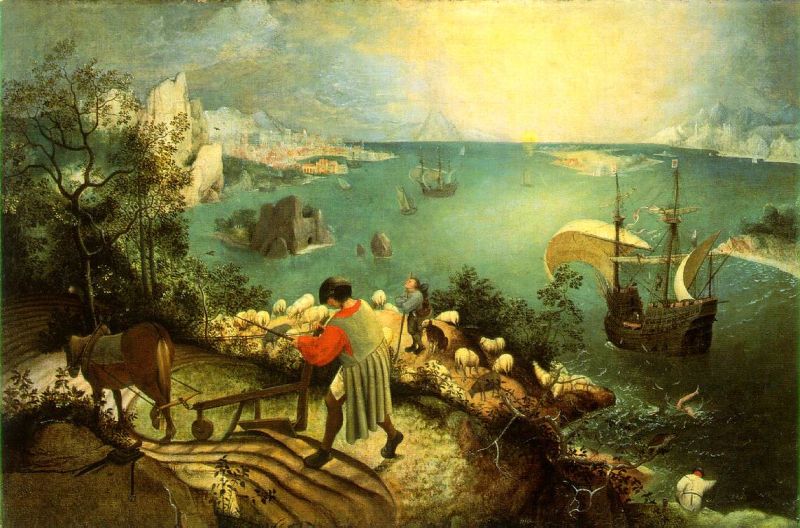 Landscape with the Fall of Icarus" c. 1554-55, oil on canvas
Landscape with the Fall of Icarus" c. 1554-55, oil on canvasby Pieter Bruegel the Elder, Netherlands (1525-1569)
Compare with:
 -Ji Lee at Wooster Collective
-Ji Lee at Wooster Collective
it's true.
 Landscape with the Fall of Icarus" c. 1554-55, oil on canvas
Landscape with the Fall of Icarus" c. 1554-55, oil on canvas -Ji Lee at Wooster Collective
-Ji Lee at Wooster Collective

There is nonetheless something deeply wrong with this reaction – a key dimension is missing from it. Obama’s victory is not just another shift in the eternal parliamentary struggle for a majority, with all the pragmatic calculations and manipulations that involves. It is a sign of something more. This is why an American friend of mine, a hardened leftist with no illusions, cried when the news came of Obama’s victory. Whatever our doubts, for that moment each of us was free and participating in the universal freedom of humanity.
-Slavoj Zizek
[via 3quarks]
 This is an amazing thing to say, but it’s absolutely true: All the farmers I photographed seemed genuinely happy with their life; a remarkable notion given the unprecedented struggles they’re facing today. For many, these are the toughest times they’ve ever had—but you’d never know it. They’re too proud. I know they all worry about the future, about the well-being of the next generation, but another day is a good day to them. They simply take whatever the world gives them, and they give back as much as they possibly can. No rain? We’ll scrape by. Too much rain? We’ll replant. Never once did I get the feeling that they would ever consider doing anything else. They love what they do—and it’s the purest love you can imagine. No matter the conditions that test their mettle, they never give up or doubt their purpose. Retirement is almost unheard of, because for the farmer life is work. I remember a farmer telling me his philosophy on life: “The harder I work the luckier I get.”
This is an amazing thing to say, but it’s absolutely true: All the farmers I photographed seemed genuinely happy with their life; a remarkable notion given the unprecedented struggles they’re facing today. For many, these are the toughest times they’ve ever had—but you’d never know it. They’re too proud. I know they all worry about the future, about the well-being of the next generation, but another day is a good day to them. They simply take whatever the world gives them, and they give back as much as they possibly can. No rain? We’ll scrape by. Too much rain? We’ll replant. Never once did I get the feeling that they would ever consider doing anything else. They love what they do—and it’s the purest love you can imagine. No matter the conditions that test their mettle, they never give up or doubt their purpose. Retirement is almost unheard of, because for the farmer life is work. I remember a farmer telling me his philosophy on life: “The harder I work the luckier I get.”